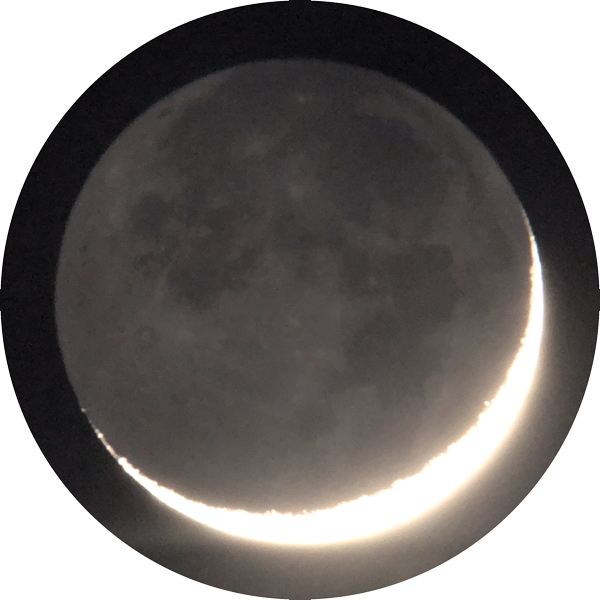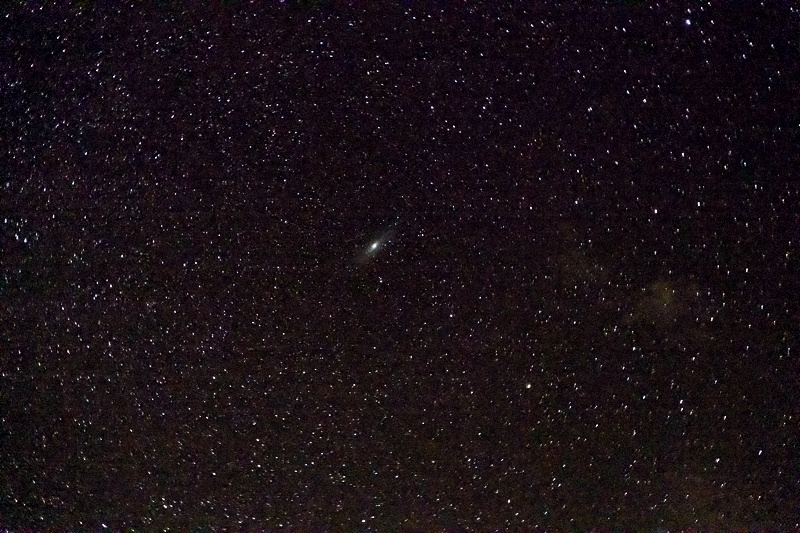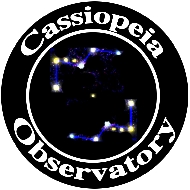Crescent Moon;
Handheld Andromeda Galaxy test images
Posted: 10 November 2018
Some clouds and wind began arriving Thursday evening, 8 November 2018, but were mostly gone by late afternoon on Friday, 9 November.
|
Open: Friday, 9 November 2018, 1806 MST Temperature: 72°F |
Session: 1301 Conditions: Mostly clear, breezy |
Equipment Used:
12" f/8 LX600 w/StarLock
2" 24mm UWA eyepiece
2" 30mm eyepiece
Camera:
iPhone 8 Plus
D850 DSLR
1810 MST: LX600 ON, StarLock OFF, High Precision OFF.
Viewed the crescent Moon and Earthshine, 102X and 81X.
Took these handheld iPhone 8 Plus afocal 81X photos of the Moon and Earthshine using the iOS app NightCap Camera (ISO 1000, 1/400sec, and ISO 800, 1/6sec, respectively):


I then stepped outside of the observatory and took these handheld D850 DSLR photos of the Moon (f/2.8, 1/10sec, ISO 3200, FL 70mm, and f/5.6, 1/4sec, ISO 5000, FL 56mm, respectively):


1824 MST: returned to the observatory for some more lunar observing, 102X.
I tried to observe the planet Mercury but it was too low in the sky.
Viewed Saturn, then Mars, 102X. Seeing was not good.
1840 MST: the breezes were getting stronger and clouds were increasing from the southwest.
1851 MST: decided to end the session due to the deteriorating observing conditions.
1853 MST: LX600 OFF.
I got curious about trying to image the Andromeda Galaxy (M31) using the Nikon D850 DSLR handheld. The combination of its high ISO capabilities and the f/2.8 Tamron VR lens could make for interesting photos. I took three photos at f/2.8, 1 second, FL 70mm. Here are the full-frame images, with some post-processing:
ISO 25600

ISO 51200

ISO 102400

Some faint clouds that were not visible to the eye also appear in the photos. The ISO 102400 shows a lot of digital noise, but that could probably be mostly removed with a lot of post-processing with appropriate tools. I didn't take the time to do that for these tests Still, some amazing results.
|
Close: Friday, 9 November 2018, 1902 MST Temperature: 64°F |
Session Length: 0h 56m Conditions: Partly cloudy, breezy |
I was recently interviewed by two local 6th grade girl students for their project on Light Pollution. They had to pick a project on their own and they selected Light Pollution. The interview was video recorded, during which they asked me specific questions about the harmful effects of Light Pollution. It was really incredible to see this level of interest by grade school students!
Comments are welcome using Email. Twitter users can use the button below to tweet this report to their followers. Thanks.
Cassiopeia Observatory Home Page
Copyright ©2018 Michael L. Weasner / mweasner@me.com
URL = http://www.weasner.com/co/Reports/2018/11/10/index.html
